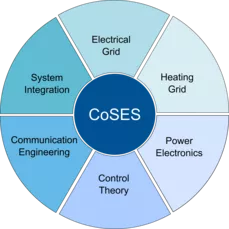Background
A transition to more climate friendly energy systems imposed significant changes in their planning and operation. These changes are characterized by intensive exploitation of renewable energy sources, such as solar and wind, and more efficient operation of the system through the use of Information and Communication Technology (ICT) systems. Exploiting the property of electricity to be easily converted to different types of energy and the trend of extensive electrification of heating, cooling and transportation energy systems through wider adoption of micro CHP systems, heat pumps and electric vehicles, power system is widely recognized to play a role of a backbone of the future integrated energy systems.
These changes have brought a paradigm shift in the power system operation but also imposed several challenges that are the focus of power systems research community, such as analysis of dynamic behavior in low inertia systems, undispatchable and uncertain energy sources, unpredictable power flows, etc. The distribution systems, which are traditionally designed as passive radial grids, have to be restructured to incorporate a new concept of prosumers and bidirectional flows. This has led to the introduction of the microgrid concept, which assume controllable entities that are able to reliably supply power to consumers even without connection to the wide area synchronous grid.
Salient features of CoSES Lab
-
Flexible electric grid that consists of an experimental and a feedback grid;
-
Distributed generation, Battery energy storages, EV charging stations;
-
Fully controllable domestic electric consumption/ production;
-
Bidirectional district heating/cooling grid;
-
Domestic consumption with distributed heat sources (heat pumps, CHPs, Solar thermal);
-
Control and monitoring infrastructure
